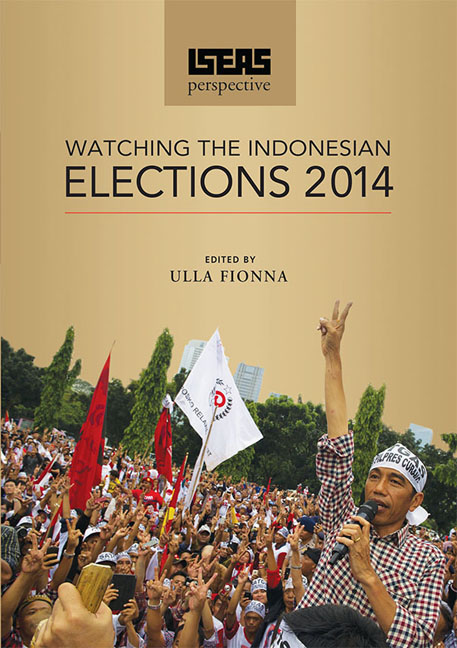Book contents
- Frontmatter
- Contents
- Foreword
- Introduction
- 1 The Gubernatorial Race in Jakarta: Background and Implications
- 2 Indonesian Parties Struggle for Electability
- 3 Who Will Be Indonesian President in 2014?
- 4 Indonesian Presidential Election Forcing Rejuvenation of Parties
- 5 Resisting Democracy: Front Pembela Islam and Indonesia's 2014 Elections
- 6 Getting to Know the Contestants of the 2014 Indonesian Parliamentary Elections
- 7 A Snapshot of the Campaigning in Indonesia's 2014 Legislative Elections
- 8 Unpacking the Results of the 2014 Indonesian Legislative Elections
- 9 Indonesia's 2014 Legislative Elections: The Dilemmas of “Elektabilitas” Politics
- 10 The Islamic Factor in the 2014 Indonesian Elections
- 11 Vote-buying in Indonesia's 2014 Elections: The Other Side of the Coin
- 12 Gap Narrows Between Candidates in Indonesian Presidential Elections
- 13 Analysing the Economic Platforms in the Indonesian Presidential Election
- 14 Indonesian Islamic Parties After the 2014 Elections: Divided and Self-Centred
- 15 Safeguarding Indonesia's Pluralism: An Essential Task for Joko Widodo
- 16 Jokowi's Key Economic Challenge: Improving Fiscal Policy for Equitable Growth
- 17 Crossing the River While Avoiding the Stones: Jokowi's Run-up to the Presidency
- 18 Post-elections Indonesia: Towards a Crisis of Government?
- Epilogue: Jokowi's First Months: Compromise Cabinet, Subsidy Cuts, and Corrupt Coalition
Epilogue: Jokowi's First Months: Compromise Cabinet, Subsidy Cuts, and Corrupt Coalition
Published online by Cambridge University Press: 29 July 2017
- Frontmatter
- Contents
- Foreword
- Introduction
- 1 The Gubernatorial Race in Jakarta: Background and Implications
- 2 Indonesian Parties Struggle for Electability
- 3 Who Will Be Indonesian President in 2014?
- 4 Indonesian Presidential Election Forcing Rejuvenation of Parties
- 5 Resisting Democracy: Front Pembela Islam and Indonesia's 2014 Elections
- 6 Getting to Know the Contestants of the 2014 Indonesian Parliamentary Elections
- 7 A Snapshot of the Campaigning in Indonesia's 2014 Legislative Elections
- 8 Unpacking the Results of the 2014 Indonesian Legislative Elections
- 9 Indonesia's 2014 Legislative Elections: The Dilemmas of “Elektabilitas” Politics
- 10 The Islamic Factor in the 2014 Indonesian Elections
- 11 Vote-buying in Indonesia's 2014 Elections: The Other Side of the Coin
- 12 Gap Narrows Between Candidates in Indonesian Presidential Elections
- 13 Analysing the Economic Platforms in the Indonesian Presidential Election
- 14 Indonesian Islamic Parties After the 2014 Elections: Divided and Self-Centred
- 15 Safeguarding Indonesia's Pluralism: An Essential Task for Joko Widodo
- 16 Jokowi's Key Economic Challenge: Improving Fiscal Policy for Equitable Growth
- 17 Crossing the River While Avoiding the Stones: Jokowi's Run-up to the Presidency
- 18 Post-elections Indonesia: Towards a Crisis of Government?
- Epilogue: Jokowi's First Months: Compromise Cabinet, Subsidy Cuts, and Corrupt Coalition
Summary
INTRODUCTION: THE VERY SHORT HONEYMOON
Burdened with high expectations on deliverables, Indonesian President Jokowi's first few months have been hectic. The most difficult challenges anticipated at the start of his administration were: whether the cabinet would be dominated by professionals as promised; resistance from the parliamentary opposition; and his plan for an unpopular fuel price hike. Doubts about his choice of cabinet ministers have been mitigated by the hard work that some have demonstrated. Still, his choices for the chiefs of legal and judicial institutions have been met with criticism, and have raised questions about his commitment to clean government and to the combatting of corruption. Meanwhile, fortune has been on his side as the drop in crude oil prices has made the elimination of costly oil subsidies much easier. However, all these seem to be negated by the glaring fact that he remains under a lot of influence from party politicians — particularly Megawati (chairwoman of the Indonesian Democratic Party Struggle) and Surya Paloh (chairman of National Democratic Party).
HOLDING A MINORITY GOVERNMENT AGAINST CRISIS-RIDDEN OPPOSITION
With only 37 per cent seats in the parliament, Jokowi's Great Indonesia coalition (comprised of PDI-P/Indonesian Democratic Party – Struggle, Partai Nasdem/National Democratic Party, PKB/National Awakening Party, and Hanura/People's Conscience Party) has an uphill task in passing their policies. After all, 2014 saw by far the most polarizing elections being held in Indonesia, and there is still a big divide between both candidates’ camps — which has extended into the parliament where Jokowi leads a minority government against a much bigger Red and White Coalition (consisting of Partai Gerindra/Great Indonesian Movement Party, Partai Golkar/Functional Group Party, PKS/Prosperous Justice Party, PAN/National Mandate Party, and PPP/United Development Party), led by Prabowo.
The divide between Prabowo's supporters and Jokowi's have created splits even within individual parties, notably the PPP and Golkar. These have manifested as leadership crises that have left the two major parties in tatters. The crisis in PPP had been obvious since the presidential campaign period when Suryadharma Ali's personal move to endorse Prabowo was rejected as the party's official position. The party currently has two chairmen. Suryadharma is chairman of the PPP camp that staunchly supports Prabowo, while Romahurmuziy controls the faction that favours Jokowi.
- Type
- Chapter
- Information
- ISEAS PerspectiveWatching the Indonesian Elections 2014, pp. 177 - 184Publisher: ISEAS–Yusof Ishak InstitutePrint publication year: 2015

